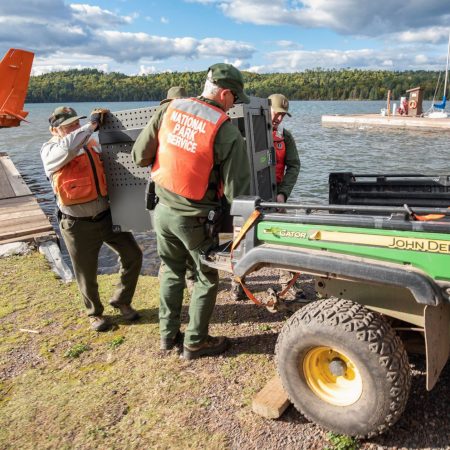Unexpected medical issue grounds Isle Royale wolf-moose survey
Isle Royale is a 134,000-acre (54,200-hectare) island in far western Lake Superior between Grand Marais, Minnesota, and Thunder Bay, Canada. The island, which doubles as a national park, offers scientists a rare chance to observe wolves and moose in their natural habitat, free from human influence. Researchers have conducted an annual survey of the island’s wolf and moose population since 1958.
Scientists from Michigan Tech University had planned to return to the island in January to conduct seven weeks of aerial surveys by ski-planes. Snow and bare branches make tracking easier from the air in winter, but the island lacks a land-based runway, forcing the scientists to use ski-planes that can land in the island’s ice-covered harbors.
The scientists released their annual report on Tuesday, but it does not include any new population estimates. The report notes that the researchers were not able to get into the air at all this winter because “our usual aviation resources became unexpectedly unavailable due to extenuating circumstances and there was insufficient time to find a suitable alternative.”
Michigan Tech spokesperson Hailey Hart explained in a telephone interview that the ski-plane pilot developed a last-minute medical issue and couldn’t fly. The scientists were unable to find a replacement pilot.
“It was very sudden,” Hart said. “It was a big bummer for them.”
Researchers have experienced disruptions in three of the last five years they’ve attempted the survey. The COVID-19 pandemic forced them to cancel the survey in 2021, marking the first time since 1958 that population counts weren’t conducted.
They had to cut the survey short in February 2024 after weeks of unusually warm weather left the ice surrounding the island unsafe for ski-plane landings. The National Park Service suspended the researchers’ work and ordered them to evacuate.
Data the scientists gathered before they left showed the wolf population stood at 30 animals, down from 31 the previous year. The moose population stood at 840, down 14% from 2023.
Most of Tuesday’s report discusses observations a group of college students made on the island in the summer of 2024. They noted regular wolf sightings, observed a wolf chasing a moose and found the bones of a wolf that died a decade ago, well before the park service began relocating wolves to the island in 2018. The students also found the remains of 115 moose, including 22 believed to have died in 2024. Researchers believe wolves killed all but three of those moose.
Hart said the scientists are planning another aerial survey next winter.
–Reporting by Todd Richmond, The Associated Press
The post Unexpected medical issue grounds Isle Royale wolf-moose survey appeared first on WDET 101.9 FM.




